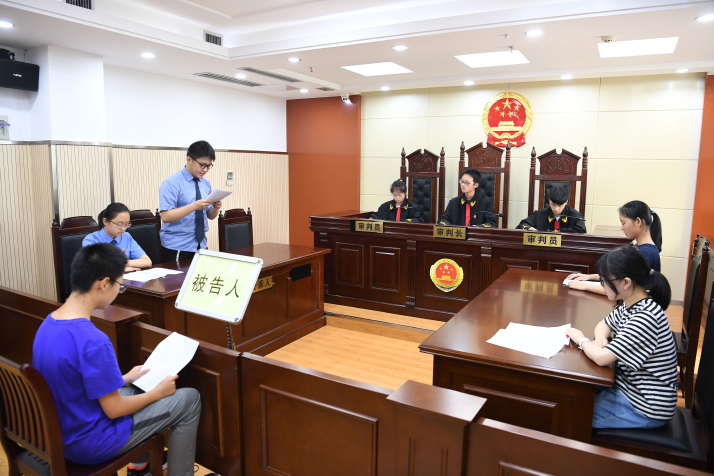| Opinion |
| Passage of Civil Code marks a milestone in the rule of law | |
| The birth of the Civil Code marks significant progress in the development of the socialist legal system with Chinese characteristics and the modernization of China's national governance | |
|
|
 A resident reads about the Civil Code in a newspaper in a park in Beijing on May 26 (XINHUA)
Democratic legislation Civil law is the basic law to adjust the personal and property relations of citizens. The compilation of the Civil Code concerns people's livelihood, social harmony, and national prosperity. The Fourth Plenary Session of the 18th CPC Central Committee in 2014 put forward the legislative task of compiling a civil code. Under the leadership of the CPC, through research and discussions with legal experts and a democratic legislative process, the Civil Code was finally adopted at the Third Session of the 13th National People's Congress (NPC), the national legislature, on May 28. China made four attempts to compile the Civil Code after 1954, but the undertaking was shelved owing to immature social conditions. However, legislation related to the Civil Code never stopped. A series of individual civil laws including the Marriage Law and Property Law were passed, laying a solid foundation for the compilation of the Civil Code. On June 14, 2016, General Secretary of the CPC Central Committee and President Xi Jinping chaired a meeting of the Standing Committee of the Political Bureau of the CPC Central Committee and listened to briefing on several major questions regarding the compilation of the Civil Code and the draft General Provisions of the Civil Law by the Leading Party Members' Group of the NPC Standing Committee and gave instructions. The General Provisions of the Civil Law, the opening chapter of the Civil Code, was adopted in 2017. During the compilation of the Civil Code, the top legislature widely solicited opinions from the people and pooled the wisdom of legal experts. The Civil Code reflects the will of the people. Requirement of the times The Civil Code is not just a combination but a systematic synthesis of existing laws. It consists of general provisions and six individual sections respectively on property, contracts, personality rights, marriage and family, inheritance and torts. It has 1,260 articles and reflects the latest results of theoretical and practical development of China's civil law theories. The Civil Code represents a people-oriented approach. As socialism with Chinese characteristics has entered a new era, the principal contradiction facing Chinese society has become the contradiction between "unbalanced and inadequate development and the people's ever-growing needs for a better life." Guaranteeing personal dignity is crucial for people to gain a sense of happiness in the new era. The Civil Code includes an innovative independent section on personality rights, which not only helps protect typical personality rights such as the right to life but also other rights such as personal freedom and dignity, expanding the scope of personality rights. It adds stipulations regarding new civil relations in society. For instance, to meet the requirement of law-based responses to public health crises like the novel coronavirus disease, it adds stipulations on special procedures for using the property maintenance fund in emergencies. The right of habitation added to the section on property rights aims to protect the habitation rights of disadvantaged groups and is in line with the property market control policies that encourage both housing purchase and renting. The section on contracts adds provisions on property service contract to protect property owners' right to use their properties. In response to the need for personal information protection in the Internet era, it has strengthened protection of data and virtual assets, improved the rules for formulating electronic contracts and taken into consideration cases of rights violations on the Internet. The Civil Code follows socialist core values. Articles 5 to 7 of the Civil Code have established the principles of voluntariness, fairness and honesty for civil activities and Article 8 stipulates that civil activities should not trample morality or violate regulations. In addition, it includes the green principle. For example, the implementation of a contract specifically requires the conservation of resources, the protection of the environment and punitive compensation for any ecological damage caused.  A moot court is held at a procuratorate in Hefei, Anhui Province in east China, on July 4, 2019 to enhance children's legal awareness (XINHUA)
National governance The premise of sound national governance is the rule of law. The adoption of the Civil Code will help optimize the national governance system and provide legal guarantee for the improvement of national governance capacity. The goal of China's national governance is to realize the Chinese dream of national rejuvenation and promote the overall development of the people. The Civil Code has formed systematic rules to protect the civil rights of citizens. For instance, the general provisions have defined civil subjects, civil rights, civil juristic acts, agency, civil liability and limitation of action. They have defined non-profit legal persons as legal persons established for charitable or other non-profit purposes that don't distribute any profit to contributors, founders or members. The legal person mainly include public institutions, social organizations, foundations and social services. The identification of these entities' legal status and responsibilities will help engage them in social governance. The key to national governance is active exercise and restriction of public power according to law. The Civil Code has set the scope of citizens' freedom to set a limit on public power. It has listed equality as the primary principle and emphasized the equal legal status of public and other market entities in market competition. The core of China's civil legal system, the Civil Code's enactment will promote the rule of law. However, passing it itself is not the end for the improvement of the civil legal system. How to ensure the implementation of the Civil Code, formulate relevant and supportive laws and regulations and amend and improve relevant laws, regulations and judicial interpretations will be important tasks. The author is a professor with Peking University Law School (Print Edition Title: A New Chapter) Copyedited by Madhusudan Chaubey Comments to wanghairong@bjreview.com |
|
||||||||||||||||||||||||||||
|